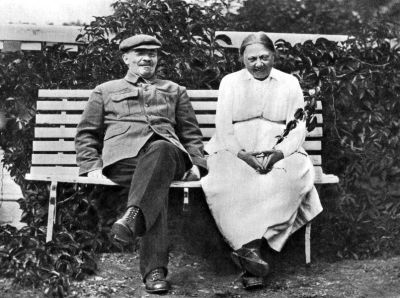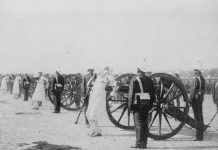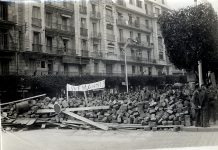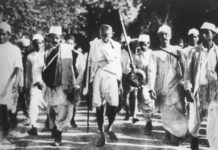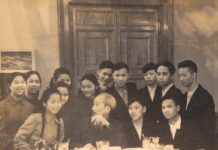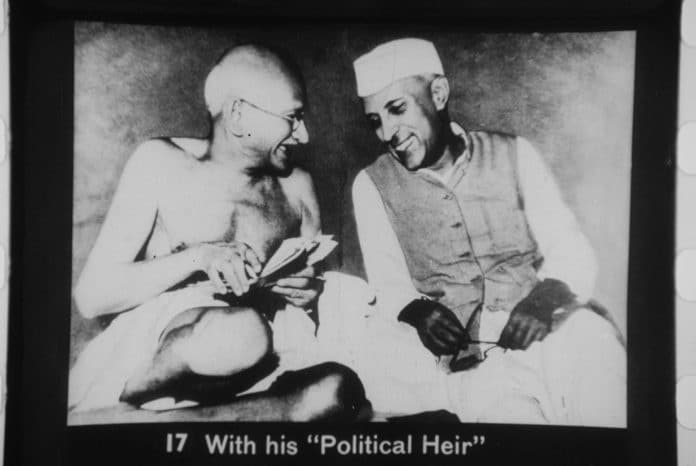
Socialistisk Biblioteks Tidslinje med links til begivenheder og personer i 1869.
Se også Index over personer, organisationer/partier og værker (som bøger, malerier, mm.), steder, begivenheder, mv., der er omtalt på hele Tidslinjen, titler og indhold på emnelisterne osv.
[sta_anchor id=”18690126″ /]
26. januar 1869
Den russiske revolutionære og bolsjevik Nadesjda Krupskaja, sekretær for og gift med Lenin, født i Sankt Petersborg. Hun dør 27. februar 1839 i Moskva.
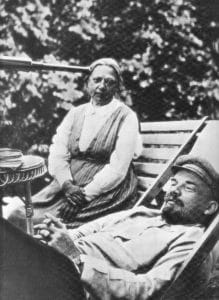
Leksikale på dansk:
- Krupskaja, Nadesjda Konstantinovna (Leksikon.org)
- Nadezdja Krupskaja (Denstoredanske). Kortere biografi.
- Nadesjda Krupskaja (Wikipedia.dk). Med links til bl.a. længere engelsk artikel.
På dansk/svensk:
Texter av Nadezjda Krupskaja (Marxistarkiv.se). 2 artikler på svensk.
N.K. Krupskaja: Erindringer om Lenin. Bd. 1 (Mondes Forlag, 1934, 220 s.; ny udgave Tidens Forlag, 1975, 220 s.). Se om denne udgave: Forfalskning. Af Børge Trolle (Minavisen, 16. september 1975, s.4)
In English:
- Nadezhda Krupskaya (Wikipedia.org). Longer article in English.
- Nadezhda K. Krupskaya, 1869-1939 (Marxists Internet Archive). Works, incl. audio.
Trotsky, Krupskaya and the Bolshevik tradition. By Paul Le Blanc (Marxist Essays and Commentary, August 29, 2021). “This discussion of Trotsky’s relationship to Lenin’s Bolshevik organization will be based on reflections of Nadezhda Krupskaya, one of the founders and central figures of the Bolshevik tradition … The life and ideas of Leon Trotsky are well known, and they will be touched on in the main portion of this presentation. But before coming to that, I want to focus additional attention on Nadezhda Krupskaya.”
Women on the Left: Nadezhda Krupskaya (Counterfire, March 15, 2012). “Nadezhda Krupskaya has been described as ‘one of the of the most tragic figures in revolutionary history’. Sarah Collins examines her life and work as a Bolshevik activist.”
Nadezhda Krupskaya, a revolutionary fighter, feminist and pioneer of socialist education. By Graham Milner (Links: International Journal of Socialist Renewal, March 7, 2010). “Following the 1917 October Revolution, Krupskaya played an important role in developing public education and cultural life in the Soviet state.”
Krupsjaya’s death. By Leon Trotsky (New International, Vol.5 No.4, April 1939, p.117; online at Marxists Internet Archive). “In addition to being Lenin’s wife which – by the way, was not accidental – Krupskaya was an outstanding personality in her devotion to the cause, her energy and her purity of character.”
Literature:
- N.K. Krupskaya’s Reminiscences of Lenin (International Publishers, 1970, 553 p.; online at Marxists Internet Archive). Written 1933.
Se på Socialistisk Bibliotek:
Personlisten: Nadezdja Krupskaja (1869-1939). P.t. kladde.
[sta_anchor id=”18690204″ /]
4. februar 1869
Den amerikanske fagforeningsleder, grundlægger og leder af Industrial Workers of the World (IWW), William D. Haywood (‘Big Bill’ Haywood) fødes i Salt Lake City, Utah. (Dør 18. maj 1928 i landflygtighed i Moskva, fra marts 1921).
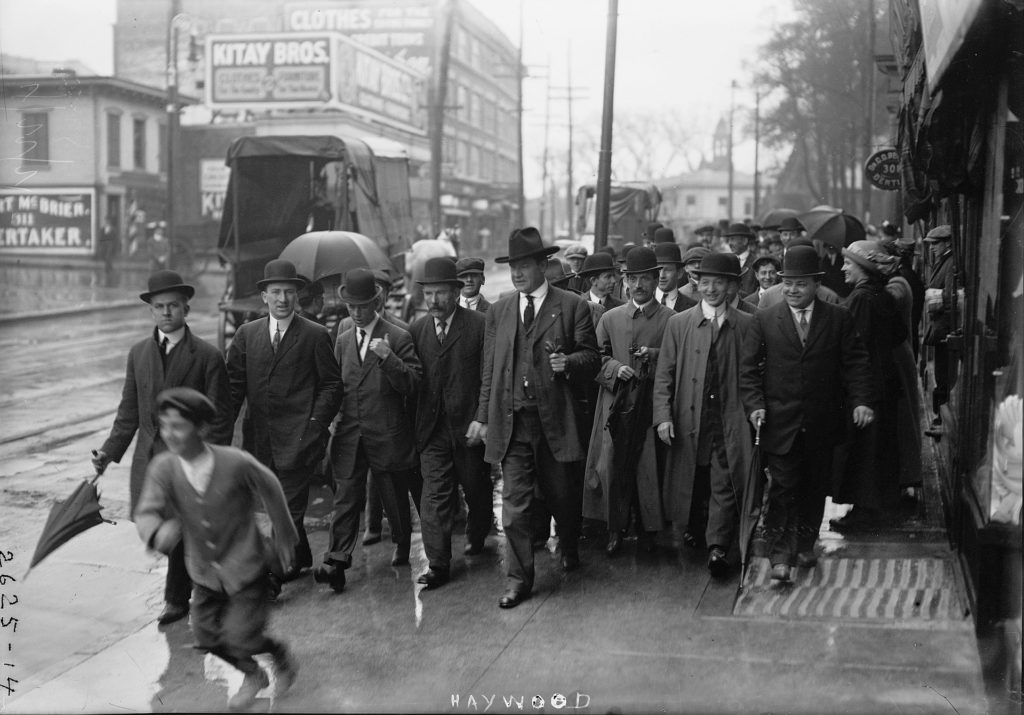
Links:
- Bill Haywood (Wikipedia.org)
- William Haywood (Spartacus Educational)
- Haywood, (Big) Bill (Marxists Internet Archive: Political Biographes; scroll down)
- William “Big Bill” Haywood (Anarchy Archive). With Biography, Bibliography, Collected Works, Commentary and Graphics.
The Big Red Songbook and The Revolutionary Journalism of Big Bill Haywood. By Julie Sherry (Socialist Review, Issue 416, September 2016). Review of two books.
Big Bill Haywood – a fighter against the bosses and revolutionary trade unionist (Socialist Worker, Issue 2513, 19 July 2016). “Big Bill Haywood was a giant of the US workers’ movement. John Newsinger has edited a new collection of Haywood’s journalism and writes on the life of the revolutionary.”
Happy Birthday Big Bill (Socialist Review, Issue 292, January 2005). “Mike Davis commemorates the centenary of a high point in American socialist history.”
Out of the past – Bill Haywood (February 4, 1869–May 18, 1928). By Emanuel Garrett (Socialist Appeal, Vol.3, No.7, 14 February 1939; online at Marxists Internet Archive). “Bill’s towering figure (he was as large in body as he was unyielding in his devotion to the cause of the working-class) is associated with many stirring pages of labor history.”
William D. Haywood, Communist ambassador to Russia (pdf). By David Karsner (The Call Magazine, May 1, 1921, 3 p.; online at Marxists Internet Archive). “We do not know Haywood’s intentions in Russia, but we can be assured that they are revolutionary.”
Bill Haywood, Communist. By Max Eastman (The Liberator, April 1921; online at Marxists Internet Archive). Max Eastman interviews Bill Haywood.
Bill Haywood Trial (1907) (Famous Trails. By Douglas O. Linder).
Litteratur:
- Bill Haywoods bog. Af William D. Haywood. Oversat af Svend Wandall, bearbejdet af Peter Poulsen (Gyldendal 1979, 352 s.). På omslaget: Erindringer.
- The Revolutionary Journalism of Big Bill Haywood: On the picket line with the IWW. Edited and introduced by John Newsinger (Bookmarks, 2016, 160 p.). See review by Julie Sherry (Socialist Review, Issue 416, September 2016)
- ‘Big Bill’ Haywood. By Melvyn Dubofsky (Manchester University Press, 1987, 184 p.) (Lives of the left)
Se også på Socialistisk Bibliotek:
- Tidslinjen 27. juli 1905 om Industrial Workers of the World (IWW).
[sta_anchor id=”19690626″ /]
26. juni 1869
Den danske proletarforfatter Martin Andersen Nexø fødes på Christianshavn (Dør i Dresden, DDR, 1. juni 1954, se denne).
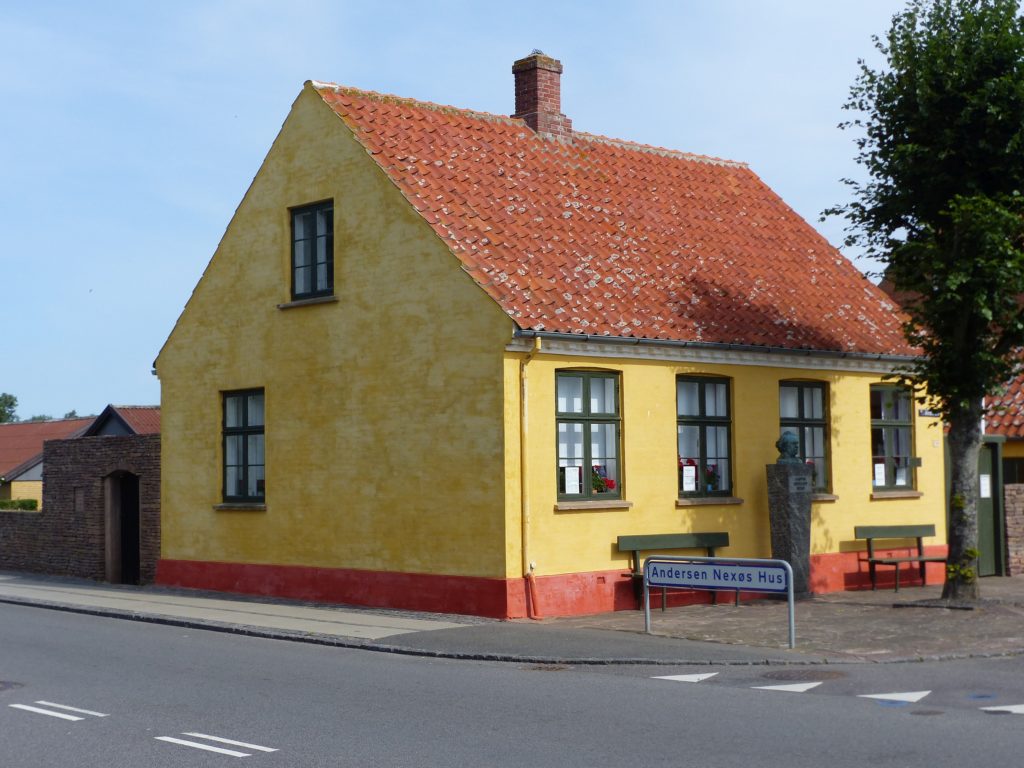
Illustration: Fra 1877 var dette Martin Andersens barndomshjem i Nexø på Bornholm
Se links på emnelisten:
- Andersen Nexø, Martin (Socialister på Assistens Kirkegård)
[sta_anchor id=”18690627″ /]
27. juni 1869

Anarkisten Emma Goldman fødes i Kaunas, Lithauen. (Dør 14. maj 1940 i Toronto, Canada).
Se på Socialistisk Bibliotek:
- Personlisten: Emma Goldman, med Leksikon, sites, artikler af og om Emma Goldman & videoer.
[sta_anchor id=”18691002″ /]
2. oktober 1869
Den indiske nationalistbevægelses grundlægger Mohandas Karamchand (Mahatma) Gandhi fødes i Porbandar, Indien. (Myrdes 30. januar 1948 i Delhi).
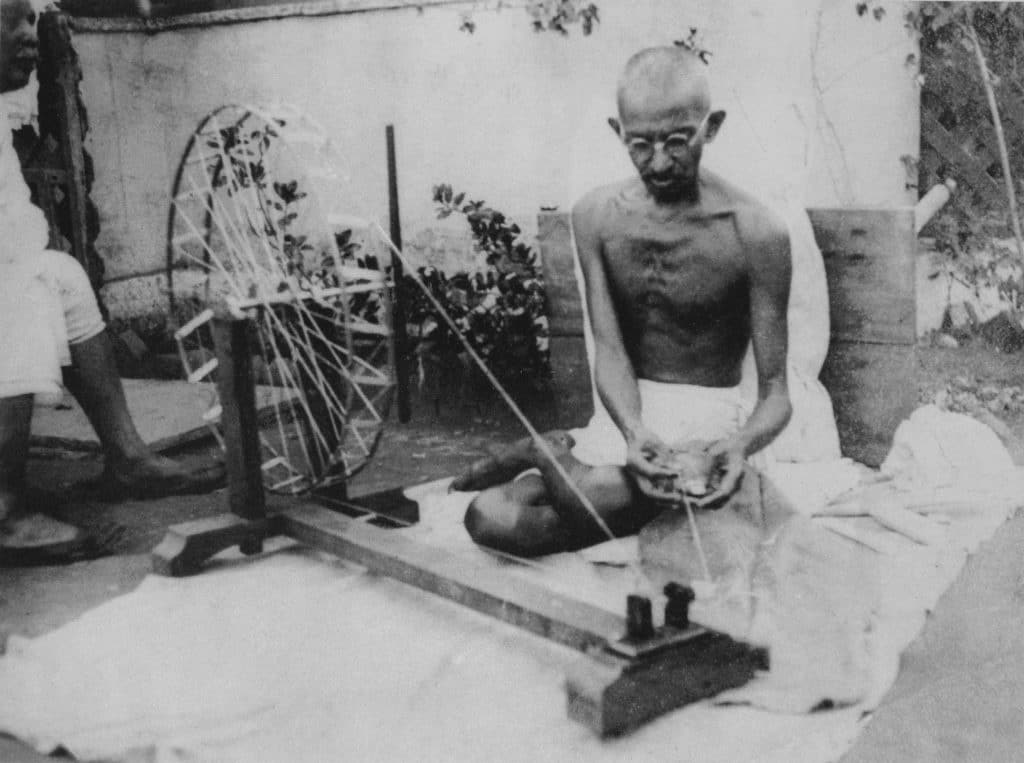
Links:
- Gandhi, Mohandas K. (Leksikon.org)
- Mahatma Gandhi (Denstoredanske.dk)
- Gandhi [Gandhiji], Mohandas Karamchand [Mahatma] (Det Danske Fredsakademi)
- Nordisk Gandhi-bibliografi: Bøger, tidsskriftsartikler og avisartikler om og af Gandhi … Af Kirstine Rønnov Due (The Transnational Foundation for Peace and Future Research)
- Mer material om Gandhi (Folkrörelser och Protester)
-
Mahatma Gandhi (Wikipedia.dk) + Mahatma Gandhi (Wikipedia.org)
Nordiske sprog:
Gandhi var åndelig leder, ikkevoldeligt ikon og besat af sex. Af Signe Lene Christiansen og Katarina Lewkovitch (Dr.dk, 2. oktober 2016). Interview med Thomas Blom Hansen: “Mordet på Gandhi gjorden manden til en myte, men bagved den åndelige leders berømte budskab om ikkevold og indisk uafhængighed gemmer sig også skyggesider.”
Indien: Opgør med ikonet Mahatma Gandhi. Af Alfred Lang (Modkraft.dk, 6. oktober 2014). “Den indiske forfatter og aktivist Arundhati Roy har fået en straffesag på halsen for at sætte spørgsmålstegn ved den officielle historie om landsfaderen Mahatma Gandhi.”
I anledning af Mahatma Gandhi’s fødselsdag 2. oktober. Af Holger Terp (Arbejderen.dk, 8. oktober 2008). “Det danske fredsakademi har publiceret en række værker af og om Gandhi på både dansk og engelsk til belysning af Gandhi og hans samtid.”
Den store befrier Gandhi? Af Farooq Sulehria (Gaia, nr.59, forår 2008). “Mahatma Gandhis ikke-voldsfilosofi har givet ham gurustatus over hele verden, og den nævnes ofte som forklaringen på Indiens befrielse fra det britiske kolonistyre. Men ifølge Farooq Sulehria fra Pakistan var Gandhi en realpolitisk hykler og det var snarere væbnet kamp, der første til løsrivelsen.”
In English:
Gandhi led a mass movement for India’s freedom — but he also constricted it. By Talat Ahmed (Jacobin, January 18, 2021). “The movement led by Gandhi is a touchstone for advocates of non-violent resistance today. But the conventional view overlooks the limitations of Gandhi’s political philosophy, and the importance of insurrectionary struggles that he opposed in the fight for Indian independence.” See also: Talat Ahmed on Gandhi and the politics of sainthood (Jacobin Radio, March 20, 2021, 1:22:38 hour).
Gandhi, violence and victory – which tactics can win real change? (Socialist Worker, Issue 2674, 28 September 2019). “Mohandas Gandhi’s legacy continues to inspire activists today. Socialist Worker looks back at the tactics of the mass movement that kicked the British Empire out of India.”
Mohandas Gandhi. By Harjeevan Gill (Socialist Review, Issue 447, June 2019). Review of Talat Ahmed, Mohandas Gandhi: Experiments in Civil Disobedience (Pluto Press, 2019, 208 p.). “She critically examines Gandhi’s political career and provides an understanding on how socialists should view him and his legacy.”
See also:
Review by Seamus O’Kane (Irish Marxist Review, Vol.8, No.24, 2019, p.68-70).
Revisiting non-violence. By Colette Wymer (International Socialism, Issue 169, Winter 2021).
‘Every single viceroy of India, whether they liked it or not, had to deal with Gandhi (Socialist Review, Issue 448, July-August 2019). Interview with Talat Ahmed.
Talat Ahmed on Gandhi and the politics of sainthood (Jacobin Radio, March 20, 2021, 1:22:38 hour).
Gandhi: the myths behind the Mahatma. By Ravi Mistry (In Defence of Marxism, 16 August 2017). “The truth however is that he betrayed as many as he inspired in the independence campaign, stood wholeheartedly with British imperialist interests, consolidated existing inequalities including caste, racial, and gender discrimination, and ultimately his role helped lead to the calamitous disaster of partition.”
Lessons for an aspiring movement? By Adaner Usmani (International Socialist Review, Issue 87, January 2013). Review of Norman Finkelstein, What Gandhi Says (OR Books, 2012, 100 p.). “On balance, then, What Gandhi Says disappoints.”
A different Gandhi. By Anita Desai (The New York Review of Books, Vol.58, No.7, April 28, 2011). Review of Joseph Lelyveld, Great Soul: Mahatma Gandhi and His Struggle with India (Knopf, 2011, 425 p.). “The picture that emerges is of someone intensely human, with all the defects and weaknesses that suggests, but also a visionary with a profound social conscience and courage who gave the world a model for nonviolent revolution that is still inspiring.”
Gandhi: how he came to see the true horror of the Empire (Socialist Worker, Issue 2171, 3 October 2009). “A new BBC series about the life of Indian freedom fighter Mahatma Gandhi raises interesting questions about his life and role.”
Gandhi: the man behind the myths. By Talat Ahmed (International Socialism, Issue 123, Summer 2009). “Talat Ahmed looks at the ambiguities in his politics and how the outcome of the struggle differed from what he hoped for.”
Gandhian nonviolence and its critics. By Thomas Weber (Transnational Foundation for Peace and Future Research, July 12, 2007). “I have attempted to show from were some of the major criticisms of satyagraha [nonviolent resistance] have come, criticisms that in many cases need to be taken seriously …”
Gandhi and the politics of nonviolence. By Meneejeh Moradian and David Whitehouse (International Socialist Review, No.14, Ocober-November 2000). “Gandhi’s principle of nonviolence, whose moral force propelled several mass movements forward in their initial phases, repeatedly held back the struggles at key moments.”
Struggle for the image of Gandhi. By Henry Judd (The New International, Vol.XIV, No.4, April 1948; online at Marxists Internet Archive). “Gandhi’s strength derived from his organic ties with the Indian nationalist movement. Without this movement he would have been a quaint and unimportant utopian doctrinaire.”
An open letter to the workers of India. By Leon Trotsky (New International, Vol.5 No.9, September 1939; online at Marxists Internet Archive). “The leader and prophet of this bourgeoisie is Gandhi. A fake leader and a false prophet!”
An interview with Gandhi (Labour Monthly, Vol.14, No.4, April 1932; online at Marxists Internet Archive). “The interviewer was Charles Petrasch, who was in London while Gandhi was staying there. He was able to have a long interview with the Indian leader and to put to him a number of questions which he had prepared.”
Who is this Gandhi? By Shapurji Saklatvala (Labour Monthly, Vol.12, No.7, July 1930; online at Marxists Internet Archive). “The working class should better know the whole history of Gandhi.”
Se også:
- Gandhi (film) (Wikipedia.org). About Richard Attenborough’s film from 1982.
- Marxism and Anti-Imperialism in India (Marxists Internet Archive).
Se også på Socialistisk Bibliotek:
- Tidslinjen: 12. marts 1930, om Saltmarchen / “Salt Satyagraha”.
- Tidslinjen: 15. august 1947, om Indiens selvstændighed og deling.

















